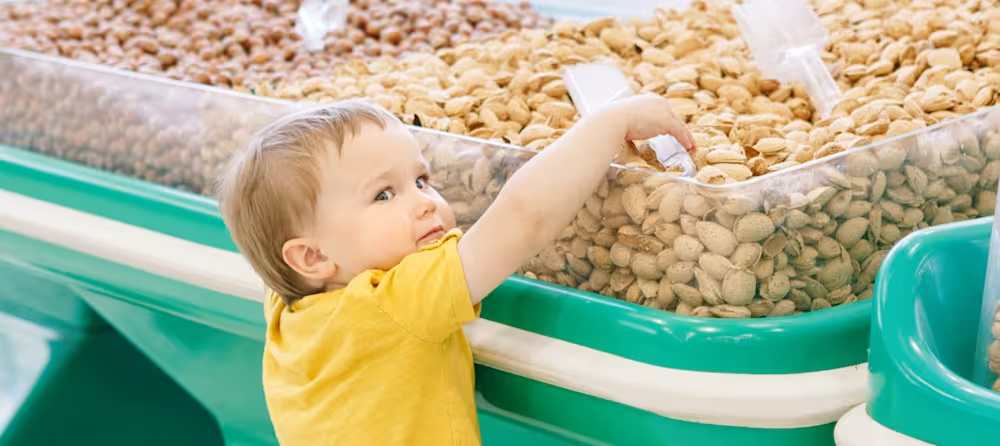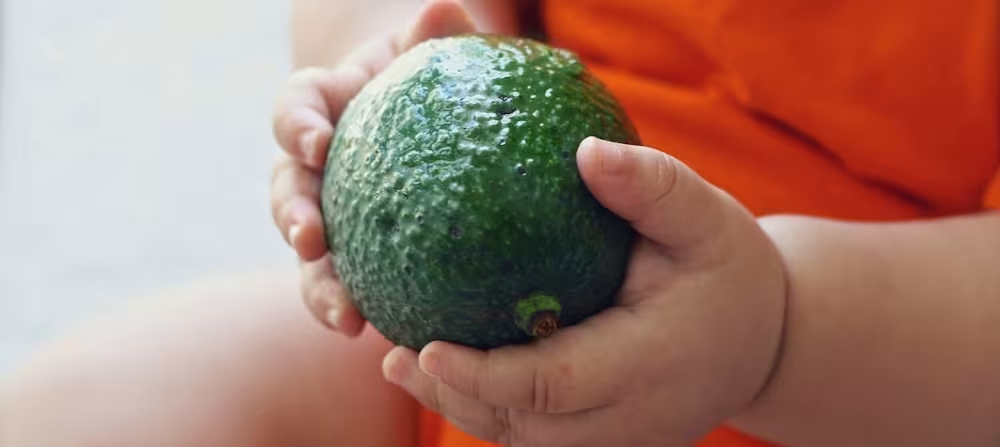Cheese for babies: When can babies eat cheese?
Updated Jan 12, 2026

Cheese is a popular food worldwide and an important part of many cultural recipes, so you may be wondering if you can serve it to your baby. The short answer is yes! Keep reading for a complete guide on cheese for babies, including when and how to introduce it.
Can babies have cheese?
Yes — cheese can be introduced around 6 months of age when your baby starts eating solids. Choose pasteurized, full-fat cheese for safety and to optimize nutritional value. Serve in small amounts (0.5 to 1 oz) to keep sodium in check. (Also choose lower sodium cheeses such as ricotta, parmesan, fresh mozzarella, and monterey jack, if possible.)
Is cheese healthy for babies?
Cheese can be a healthy and delicious addition to your baby’s diet. It contains important nutrients that support your baby’s energy needs as well as their growth and development.
Cheese nutrients for babies
Since cheese is made from milk, it contains many of the same nutrients. There's a bit of variation in terms of amounts of nutrients from cheese type to type, but most cheeses are a rich source of protein, fat, calcium, vitamin D, and vitamin B12.
Protein and fat found in cheese provide babies with a good source of energy and support overall growth. Calcium and vitamin D are important for bone health, muscle function, and immune health, and vitamin B12 helps support healthy blood cell and nervous system development.
When can babies eat cheese?
Babies can begin eating cheese around 6 months when they start solids and continue to enjoy it as they grow. Make sure to serve cheese in a way that is safe and easy for them to eat.
Can babies 6 to 9 months old eat cheese?
Yes! Babies can start to eat cheese around 6 months of age, once solids are introduced. Cheese is energy-dense, making it a great choice for one of baby’s first foods. You can also introduce it during .
Can babies 9 to 12 months old eat cheese?
Babies between 9 and 12 months can continue to eat cheese. It remains a good source of protein and fat and can help keep your baby full when paired with fiber-rich fruits and vegetables.
Can babies over 12 months old eat cheese?
Definitely! Many babies over 12 months really enjoy cheese. Eating skills are typically more developed at this age, so you can serve cheese in mixed dishes such as grilled cheese or a quesadilla.
How to introduce cheese for your baby
Start small when introducing cheese to your baby and be mindful of the sodium content in some cheeses. If possible, stick with soft, lower-sodium cheese such as ricotta, cottage cheese, or fresh mozzarella. When introducing cheese for the first time, serve earlier in the day to watch for any signs of cow’s milk allergy or lactose intolerance.
Serving cheese for baby-led weaning
Babies can start eating cheese as soon as they begin baby-led weaning. The key is to serve it in a way that’s easy for them to pick up, but is also safe. Around 6 months, try shredded cheese pieces or serve soft cheese such as ricotta or cottage cheese on a preloaded spoon. As your baby further develops their eating skills and pincer grasp, you can offer small pieces of sliced cheese. Avoid cheese cubes as they are a choking hazard.
Cheese puree for babies
Babies who start solids with purees can also have some forms of cheese. It’s best to offer soft cheese such as ricotta or cottage cheese rather than pureeing a harder cheese such as cheddar. We recommend introducing and allowing your baby to become comfortable with smooth purees before offering these lumpier cheeses.
Is cheese a common allergen?
Yes, many cheeses are made with cow’s milk, which is a common allergen. Per the latest recommendations, it’s best to introduce the top allergens early and often to reduce the risk of food allergies. If you have any concerns about introducing cheese or any other common allergens, talk to your pediatrician.
Although not an allergy, lactose intolerance may affect some people’s ability to eat cheese or other dairy products. However, some cheeses are relatively low in lactose and therefore can be tolerated by those with the condition. Although lactose intolerance is fairly uncommon in babies, some signs to watch out for are diarrhea, vomiting, bloating, and gas. If you experience any of these symptoms, make sure you mention it to your baby’s doctor.
Is cheese a choking hazard?
When served safely, cheese isn’t considered a choking hazard. Offer cheese shredded, on a preloaded spoon, or in small, thinly cut pieces. Cheese cubes and gooey, melted cheese do increase the risk of choking.
Takeaway
Cheese can be introduced with solids: Babies can eat pasteurized cheese starting at around 6 months old, as long as it’s served in a safe, age-appropriate way.
It’s nutrient-dense and filling: Cheese provides protein, fat, calcium, and vitamin D, which support growth, energy needs, and bone development.
Choose wisely and serve thoughtfully: Opt for full-fat, lower-sodium cheeses and offer small amounts to keep salt intake in check.
Texture matters for safety: Shredded cheese, soft cheeses, or thin slices are safest — cubes or sticky, melted cheese can increase the risk of choking.
Dairy reactions are possible: Because cheese is usually a cow’s milk product, introduce it early in the day and keep an eye out for signs of allergy or intolerance.
Share article:
Note: The content on this site is for informational purposes only and should not replace medical advice from your doctor, pediatrician, or medical professional. If you have questions or concerns, you should contact a medical professional.
Share article:








